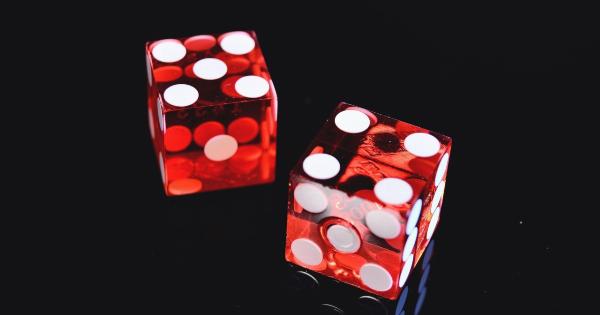Gambling addiction, also known as compulsive gambling or problem gambling, is a serious condition that can have devastating effects on a person’s life.
While many people can enjoy gambling as a form of entertainment, for some individuals, it becomes an uncontrollable urge that leads to financial ruin, relationship breakdowns, and even mental health problems. Recognizing the signs of a gambling addiction is crucial in order to provide support and intervention to those in need.
In this article, we will explore the various signs and symptoms of gambling addiction, as well as the impact it can have on individuals and their loved ones.
The Scope of Gambling Addiction
Gambling addiction is a recognized behavioral disorder that is characterized by the inability to resist the urge to gamble despite negative consequences.
It is estimated that around 2-3% of the general population struggles with a gambling problem, and the prevalence is even higher among specific groups such as college students and elderly individuals.
Signs and Symptoms of Gambling Addiction
A gambling addict may exhibit a range of signs and symptoms related to their excessive gambling habits. It’s important to note that these symptoms may vary from person to person, and not all individuals will display the same warning signs.
However, some common indicators of gambling addiction include:.
1. Preoccupation with Gambling
A person with a gambling addiction will often be preoccupied with thoughts of gambling. They may constantly plan their next gambling session, think about various strategies, or fantasize about winning big.
This preoccupation may interfere with their daily responsibilities, relationships, and overall well-being.
2. Increasing Bet Amounts
One of the key characteristics of a gambling addict is the need to place increasingly larger bets in order to experience the same level of excitement or satisfaction.
Over time, the individual may find it difficult to get the same thrill from smaller bets, leading to a dangerous cycle of escalating gambling behavior.
3. Failed Attempts to Quit or Control Gambling
A person struggling with gambling addiction may repeatedly try to cut back or quit gambling altogether, but find it incredibly challenging to do so.
Despite their best efforts, they may continue gambling in secret, lie about their gambling activities, or make promises to stop that they are unable to keep.
4. Financial Problems
Gambling addiction often leads to severe financial hardships. The individual may begin to borrow money from friends, family, or financial institutions to fund their gambling habit.
They may also resort to illegal activities or fraud to obtain the necessary funds, further exacerbating their financial struggles.
5. Neglected Responsibilities and Hobbies
As gambling takes a higher priority in a person’s life, they may neglect their responsibilities at work, school, or home. This can result in poor performance, missed deadlines, or strained relationships.
Additionally, they may lose interest in activities they once enjoyed, as gambling becomes their primary focus.
6. Emotional Instability
Gambling addiction can have a profound impact on a person’s mental health. Individuals may experience feelings of guilt, shame, anxiety, or depression as a result of their gambling behavior.
They may also become irritable, agitated, or aggressive, particularly when questioned about their gambling activities or attempts to cut back.
7. Chasing Losses
A common behavior among gambling addicts is the compulsion to chase losses. After experiencing financial losses, they may feel an intense urge to continue gambling in hopes of recouping their losses.
This can lead to a dangerous cycle of excessive gambling and further financial devastation.
8. Relationship Strain
Gambling addiction can put a significant strain on personal relationships. Partners, family members, and friends may feel neglected, deceived, or betrayed as the individual becomes consumed by their gambling habit.
Trust issues, arguments about money, and breakdowns in communication are often common occurrences in these situations.
9. Legal and Criminal Problems
For some individuals, gambling addiction can result in legal troubles.
As they resort to illegal activities to finance their gambling habit or attempt to recoup their losses, they may find themselves facing criminal charges, such as fraud or embezzlement. These legal issues can further compound the negative consequences of their compulsive gambling.
10. Denial and Defensiveness
Lastly, individuals with a gambling addiction often exhibit denial and defensiveness when confronted about their behavior.
They may become defensive, minimize the seriousness of their gambling, or refuse to acknowledge the impact it has on their life and the lives of those around them. This can make it challenging for friends and family members to intervene and offer the help and support necessary to overcome the addiction.
Getting Help for Gambling Addiction
If you suspect that you or someone you know may be struggling with a gambling addiction, seeking professional help is essential.
There are various treatment options available, including therapy, support groups, and specialized gambling addiction programs. It’s important to remember that recovery is possible, and with the right support system in place, individuals can regain control over their lives and overcome their gambling addiction.
























